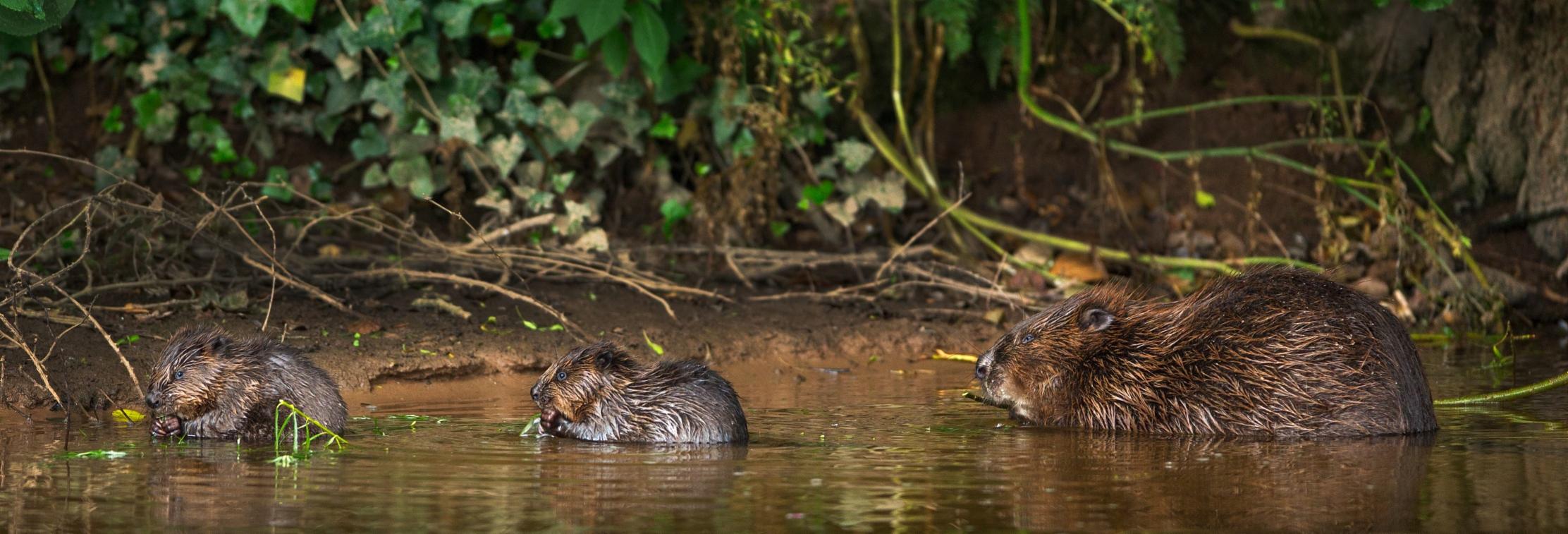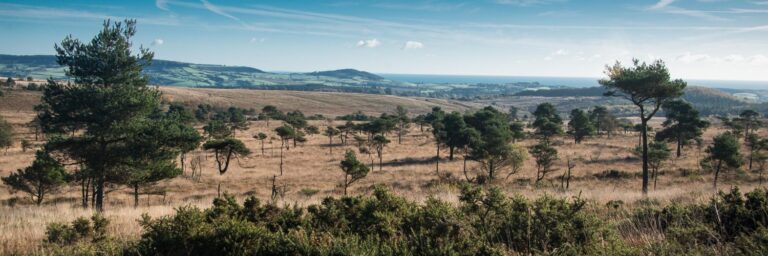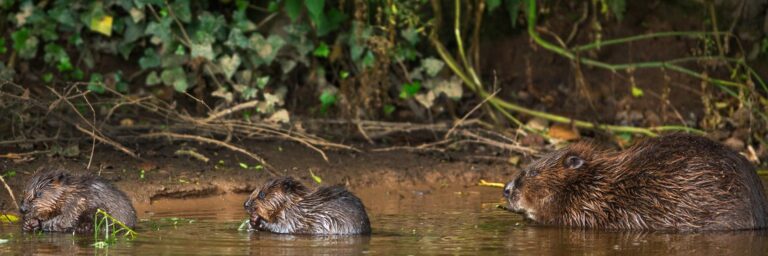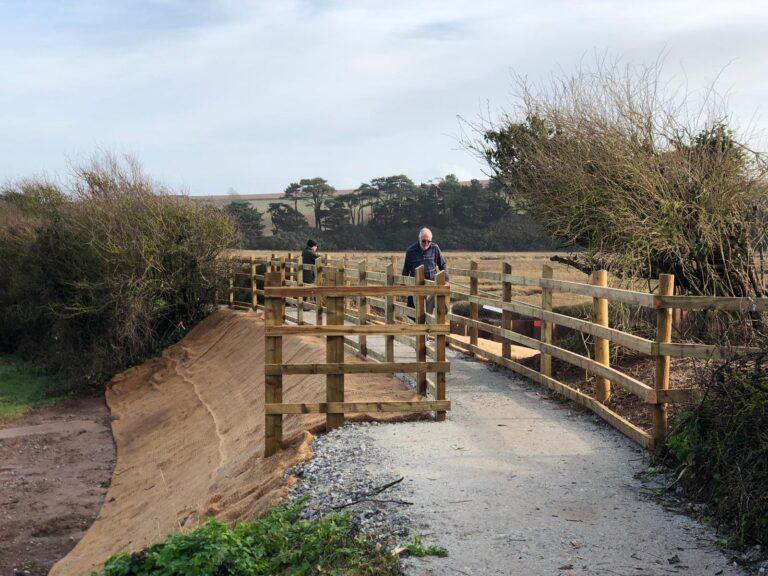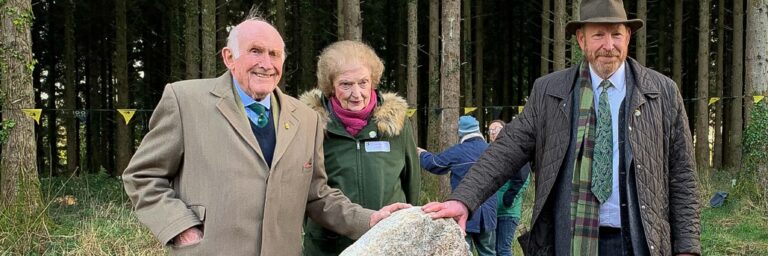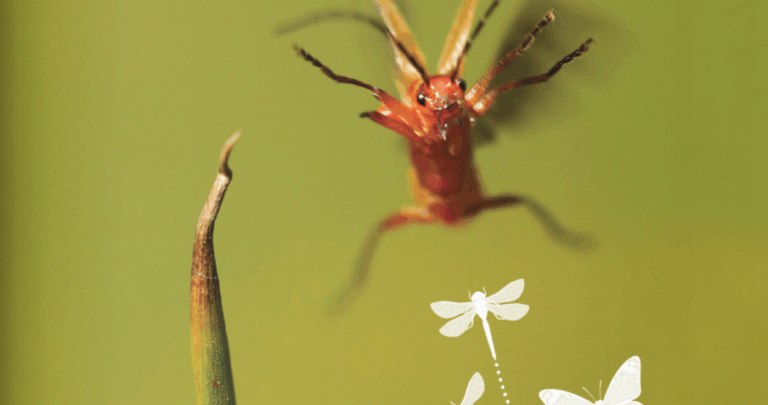Trial finds benefits to people and wildlife from beavers living wild in English countryside
- Major new science report from five-year trial finds that beavers bring benefits to people through flood alleviation and their ability to ‘clean’ water supplies
- Beavers found to greatly benefit wildlife, especially boosting numbers of fish and amphibians
- Government now to decide on what future of wild populations of beavers in England will be
A major five-year study into the impacts of beavers on the English countryside has concluded that the water-living mammals can bring measurable benefits to people and wildlife.
The study focusses upon the work of the River Otter Beaver Trial which has been led by Devon Wildlife Trust, working in partnership with the University of Exeter, Clinton Devon Estates and the Derek Gow Consultancy.
Evidence presented by scientists who have studied the beavers since 2015 has concluded that the “quantifiable costs and benefits of beaver reintroduction [of wild beavers to the River Otter, in East Devon] demonstrates that the ecosystem services and social benefits accrued are greater than the financial costs incurred”.
The ‘Science and Evidence Report’, which is published today, is based on research undertaken by a team of scientists overseen by Professor Richard Brazier from the University of Exeter. It concludes that other wildlife has greatly benefitted from the beavers’ presence, while their dam building activities have also helped reduce the risk of flooding to some flood threatened human settlements. It also concludes that while beavers have created localised problems for a handful of farmers and property owners, these can be successfully and straightforwardly managed with the right support and intervention.
The 130-page Report is published today by the River Otter Beaver Trial and is the culmination of a five-year study of England’s first licensed release of beavers into the wild in England since they were hunted to extinction more than 400 years ago. The report can now be accessed via on the University of Exeter website, and contains links to on-line videos and scientific papers and research reports compiled during the trial period https://www.exeter.ac.uk/creww/research/beavertrial.
Among the key findings of the research are:
- The wild beaver population on the River Otter’s beaver has expanded steadily over the past five years. At the Trial’s beginning in 2015 there were two breeding pairs of beavers. Today this figure stands at least eight pairs and beavers now occupy “the main stem of the River Otter and [the connected] River Tale, as well as some smaller tributaries”. Looking to the future, the scientists’ conclusion is that this “clearly demonstrates the River Otter environment will be able to sustain a healthy, expanding, beaver population.”
- Beavers have had a positive influence on the flood-prone community of East Budleigh. A family of beavers have constructed six dams upstream of the village, with the result that peak flood flows through the village have been measurably and significantly reduced.
- The Report also highlights the ability of beavers to help clean water supplies, removing large quantities of soil, manure, slurry and fertilisers from rivers and streams. At a place where beavers had built 13 dams and ponds, researchers found that beavers were playing “a significant role in filtering these pollutants from water.”
- The impact of the beavers on other wildlife was one of the most marked findings of the Trial. “The effect of beaver engineering and feeding has delivered significant ecological benefits”, concludes the Report, “with new areas of wetland habitat created and managed, with benefits for amphibians, wildfowl and water voles”.
- Fish numbers also increased where beavers built their dams. Surveys in area of the River Otter catchment showed that in the pools created by beaver dams there were 37% more fish than in comparable stretches of the river where there were no dams. Researchers also recorded trout leaping up and passing over beaver dams during high river flows.
- While the beavers have been busy building dams, none of these have been on the main ‘stem’ of the River Otter. Instead dam building has been restricted to smaller tributaries and other watercourses. In October 2019, researchers found a total of 28 dams, impounding water in just 1.9 km (0.3%) in a total of 594 km of watercourse in the whole River Otter catchment.
- Beaver activity have had an adverse impact on farmland at five sites during the 5-year study. The Trial has shown that the majority of issues arising can be addressed successfully by “active management.” During the Trial this was carried out by Devon Wildlife Trust and Clinton Devon Estates. This sometimes took the form of the removal of beaver dams, while elsewhere the installation of so-called ‘beaver deceivers’ (pipes through dams which reduce surrounding water-levels) were used.
- The Trial also recorded the high level of public support for beavers returning to the English countryside. When more than 3,000 people were asked by the Trial’s researchers whether they supported the reintroduction of beavers, 86% said ’yes’.
The University of Exeter’s Prof Richard Brazier is the chair of the Science and Evidence Forum that published the report. Prof Brazier said:
“Following five years of detailed research work, the Report concludes that the positive impacts of beavers outweighed the negatives. A summary of the quantifiable cost and benefits of beaver reintroduction demonstrates that the ecosystem services and social benefits accrued are greater than the financial costs incurred. However, it also makes clear that those who benefit from beaver reintroduction may not always be the same people as those who bear the costs, highlighting that the reduction of flood risk in communities downstream may come at a cost of water being stored on farmland upstream.”
Devon Wildlife Trust’s Mark Elliott has led the River Otter Beaver Trial for the past five years. Mark said:
“I think we’ve all been surprised by these amazing animals’ ability to thrive, once again, in our wetland ecosystems. It also shows their unrivalled capacity to breathe new life into our rivers and wetlands, very few of which are in good health. We have seen over these five years, how beavers really do have the ability to help to restore the natural processes that all our wetland wildlife depends on. As a society we get so much benefit from healthy rivers and streams that function naturally – we just need to give them greater space and appreciate them more – beavers play a crucial role in helping with that. The key to success will be to provide support for all landowners to make space for wetlands on their land – ensuring those who enable these far-reaching benefits to be provided are also able to manage their thriving rural businesses.”
The River Otter Beaver Trial’s ‘Science and Evidence Report’ has now been presented to Natural England and to Defra for a decision on the future of East Devon’s beavers, and the status of the species in England.
Natural England Chair Tony Juniper said:
“It is fantastic to see the successful reintroduction of these wonderful and fascinating creatures. Natural England has licensed this trial and I commend the work of the Devon Wildlife Trust in helping to show how beavers can have such a transformative positive impact on the natural world, while at the same time bringing practical benefits for people.
“This is a massive step towards boosting the richness of wildlife around the River Otter, reducing pollution, mitigating flooding and making this landscape more resilient to climate change.”
John Varley, Estates Director at Clinton Devon Estates, said:
“Clinton Devon Estates is proud to have played a key role in the delivery of the River Otter Beaver Trial. We have seen first-hand the benefits that beavers can bring, while also becoming more aware of the potential conflicts that can arise. What has been clear is the many ecological and biodiversity benefits that have resulted from their presence, along with their dam building activities which can mitigate flooding and also help to reduce water pollution.
“This vital research is an excellent example of how we can work with nature to improve the environment for both people and wildlife.”
A Defra spokesperson said:
“With the agreement of the Devon Wildlife Trust, Defra has taken the decision to extend the River Otter Beaver Trial until the 31st August 2020, so that Natural England and the Department can make the necessary assessments of the Trial reports and findings, recently submitted in the Trust’s Science & Evidence Report.
“This, alongside the Trial’s Beaver Management Strategy Framework, will help to inform decisions on the future of the Devon animals and the status of beaver in England, including potential management and licensing approaches.”
The River Otter Beaver Trial’s ‘Science and Evidence Report’ is available now to read at https://www.exeter.ac.uk/creww/research/beavertrial.
